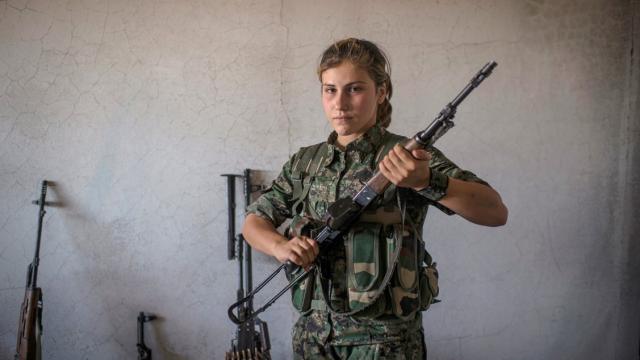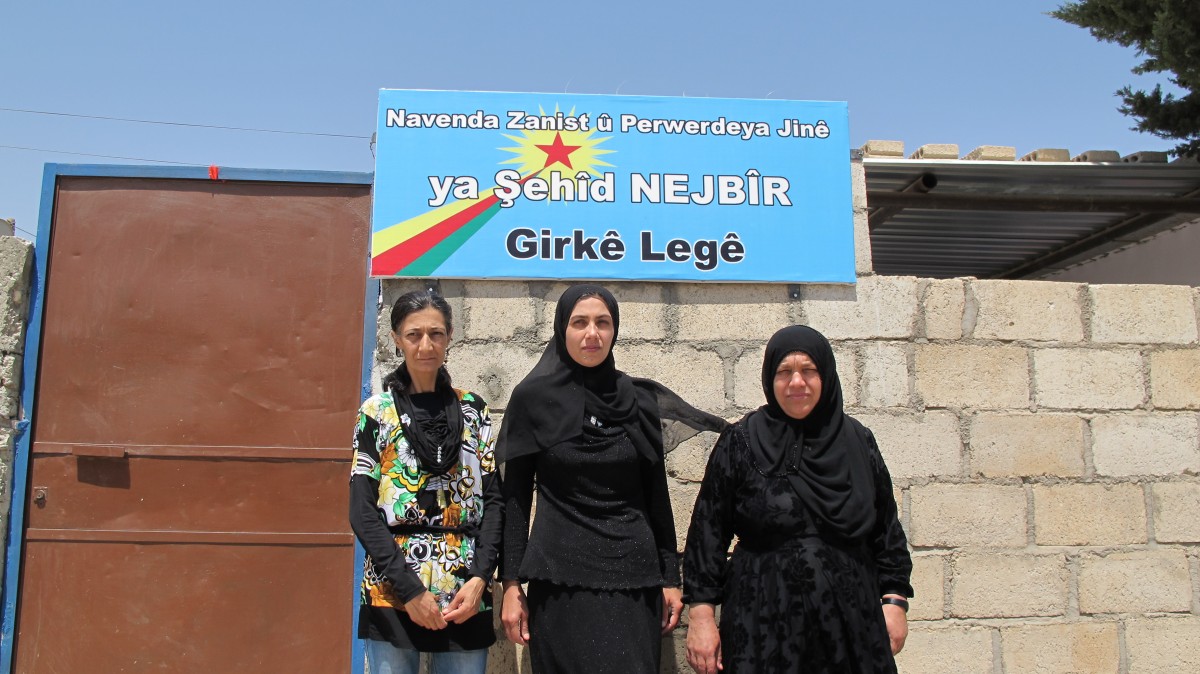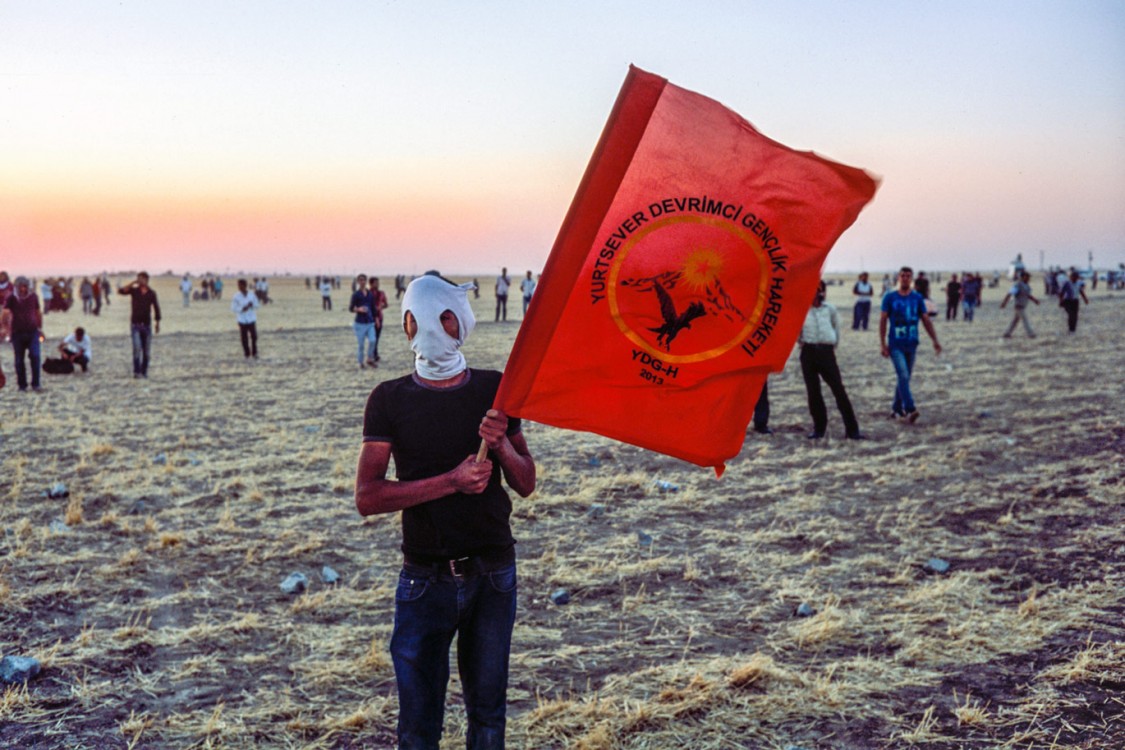
This is the last of a four-part series looking at the radical economic and social changes transforming the Kurdish communities in Rojava. Read the first, second and third parts here.
Rojava is in many ways the most unlikely of revolutions. It provides an antidote to the multiple crises of capitalism out of the ashes of the Syrian conflict and shows that another Middle East is possible. Women are leading this revolution; women’s liberation is at its core. The wholescale change has been framed as a "Third Way," a path diverging away from the state which is fundamental in the capitalist and communist systems that dominate most of the world.
With a global population of around 35 million, Kurds are often referred to as the world’s largest population without its own state. But the Democratic Confederalism model that Kurds have put into practice in Rojava, northern Syria, shows that it is possible to think beyond state and capitalism, and build public services and an economy from the bottom up.
Liberation from the state
On July 19, 2012, across the predominantly Kurdish part of the Syrian state, Assad regime forces were expelled, largely peacefully, through public uprisings backed by defense forces. The dictatorial regime had mostly withdrawn the state security apparatus to fight the influx of jihadist-fascists and other militia. The Syrian uprising was first for democracy, but descended swiftly into a proxy war between competing capitalist states.
Earlier this century in Rojava, councils were formed at the local level providing functions usually associated with the state, such as security (which often meant protection from Syria) and political education. The Women’s Confederation of Organisations, Kongreya Star, and the political party PYD drove these organizing efforts. The organizations had been banned and repressed, but after the revolution fractured Syria, they came into the open. Importantly, the People’s Council of West Kurdistan (MGRK) was created August 2011.
The MGRK is a participative people’s council system, where decisions are taken as close to the "bottom" of society as possible. For instance, these councils control the Asayîş (bottom-up police). The local street councils send elected representatives to neighbourhood councils; in turn they send elected representatives to the city councils and the same happens on the canton regional level.
Rojava consists of three cantons. The spokespeople are always one man and one women, under the principle of "dual leadership." As we explored in Part III of the series, positive discrimination to enable women’s liberation is a cornerstone of revolution in Rojava. Additionally, Kongreya Star created a parallel system of women’s councils. The representatives of the MGRK are on mandates and can be de-selected if they do not represent their local community.
Bottom-up power is the realization of thinking within the Kurdish liberation struggle fermented in North Kurdistan (Southern Turkey), a movement driven by Abdullah Öcalan, the PKK leader. Imprisoned since 1999 for fighting against the Turkish state, Öcalan shifted the Kurds' liberation struggle: initially a Marxist struggle aimed at gaining a Kurdish state, the movement went on to reject the top-down patriarchal nature of states, in tandem with rejecting capitalist oppression. Murray Bookchin’s political theories were influential.
“Democratic confederalism is open towards other political groups and factions," wrote Öcalan. "It is flexible, multi-cultural, anti-monopolistic, and consensus-oriented. Ecology and feminism are central pillars. In the frame of this kind of self-administration an alternative economy will become necessary, which increases the resources of the society instead of exploiting them and thus does justice to the manifold needs of the society." Published in 2011, the ethos underpins what has happened in Rojava since.
Filling the vacuum
From the onset of the Syrian conflict, Rojava immediately faced a humanitarian crisis. The autonomous region was under attack from ISIS, the Syrian and Turkish states, other militia and also endured a tight embargo. In response, a few key steps taken by the MGRK introduced price controls so that everyone could afford basic necessities and stop profiteers speculating on limited resources.
Rojava held a distinct advantage in that the region inherited a great deal of land abandoned by the Syrian regime. Local councils redistributed the land to farmers and newly formed cooperatives, which have become a cornerstone of Rojava’s economic system.
Working groups exist at all four levels of the MGRK system. These groups organize from the bottom up, focusing on defense, economics, civil society, free society, justice, education and coordinating with groups outside the MGRK system. Again, representatives from the different councils send elected representatives, and everyone is welcome to participate.
A social economy without a state
Pre-Syrian revolution, the three cantons of Rojava had mainly produced wheat, fruit and oil, which were all refined elsewhere in Syria. To become self-sufficient and overcome the embargo, it was vital that Rojava started producing products from its own resources. In response, cooperatives were set up, run by workers and supported through the MGRK system. The local councils provide the cooperatives with land and resources. In turn, generally 70 percent of the profits from cooperatives go to the workers while 30 percent goes back to the MGRK.
The MGRK system also took control of public services and as a result has set up schools, educational academies and other public commons. Another stream of funding comes from levies to those who can afford to pay, for instance, for water or electricity.
Peace and justice without a state
Rojava has also created a bottom-up justice system through local peace and justice committees, which seek resolution through consensus with the parties involved. Again, the principle is taking politics to the most local level. The justice system additionally focuses on rehabilitation for the person committing the crime.
Serious acts of criminality in Rojava are taken to higher courts, and the death penalty has been abolished. Violence and serious crime are dealt with by the Asayîş, with women-only Asayîş-Jin to resolve violence against women.
Beyond Rojava
What is happening in the autonomous region is explained brilliantly and in depth in "Revolution in Rojava", without which this four-part series would not be possible.
What seems to set Rojava apart is how it flatly contradicts the underlying dogmatic foundations of capitalism – such as the claim that "there is no alternative" or that you cannot have society beyond a state. Looking at the rest of the world, in fact, shows that Rojava is not entirely unique. From the Zapatistas to municipal movements, and from participative budgeting to radical independence movements and bottom-up networks worldwide, the logic and domination of capitalism is being challenged to its core.
For anyone asking if it is possible to realize a participative democracy, or a system not based on profits, Rojava proves not only that another world is possible – but that another world is right now happening.
3 WAYS TO SHOW YOUR SUPPORT
- Log in to post comments

















